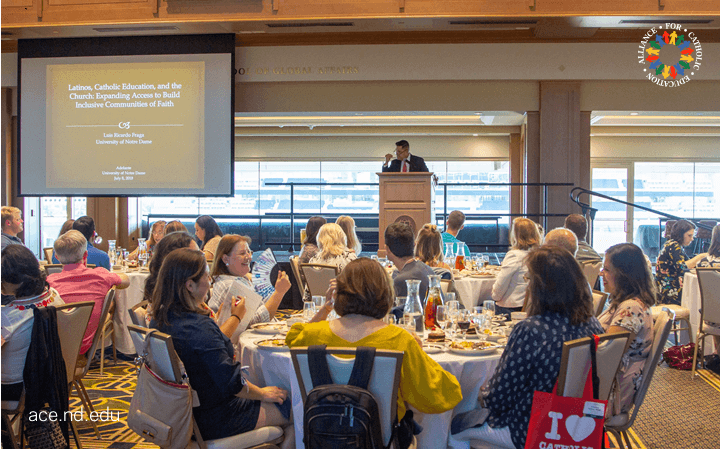"When I say, ‘The future of the Church is Latino,' I try to correct myself," said Fr. Joe Corpora, C.S.C., ACE's director of university-school partnerships, at the inaugural Adelante conference. "The present of the Church is Latino."
The conference, hosted for the first time by the Catholic School Advantage at the University of Notre Dame this month, builds on ACE's existing initiatives to support Latino students. Conference workshops addressed ways that Catholic schools can support Latino students and families from the classroom to the parish and business office, especially in light of the social, economic, and political challenges facing Latino families in the United States.
"It really cannot be, ‘You are welcome at our school,' but ‘This is your school, and we need you to be involved."
Supporting Latino students, Corpora said, is not only about increasing school enrollment, but also about celebrating the integral role that Latino families already play in shaping the Catholic Church in the United States. Adelante aims to help schools embrace, educate, and empower Latino students and families, and to help Catholic schools engage these families in leadership roles.
"It's very common, when you look at the minority—whether an ethnic one, a racial one, or a sexual one—as coming from a deficit position," Corpora said. "But they come from a position of strength as well."
John Kraus and Karen Shannahan, the principal and advancement director at Corpus Christi Catholic School in Colorado Springs, Colorado, attended Adelante seeking strategies to engage Latino families in their school community. Kraus, who previously attended ACE's Latino Enrollment Institute and ENL Hernandez Fellows program, said that Latino student enrollment at Corpus Christi has doubled to 40 percent of the school's enrollment over the past two years, with some Latino families driving as far as 25 miles so that their students can learn in the school's faith-based classrooms.
Kraus and Shannahan have helped re-envision the way that Corpus Christi engages Latino families. While they encouraged Latino families to help build school renovations two years ago, they want Latino families to also take leadership roles on school committees and in planning events for their school community.
"It really cannot be, ‘You are welcome at our school,' but ‘This is your school, and we need you to be involved," Kraus said.

Shannahan encouraged Catholic schools to find opportunities for Latino families to help lead student recruitment.
"In the Latino community, we've learned that one-on-one is best," Shannahan said about the importance of building personal relationships with Latino families in the recruitment process. "They tell their friends, they tell their families, and that's how we get Latino enrollment."
Several presentations addressed issues impacting Latino families in the United States today, including immigration. In his session on classroom management strategies for supporting Latino students, Manny Fernandez, the program director of the Latino Enrollment Institute, shared the importance of helping these students feel safe and welcome through relationship-building and engaging, culturally-responsive lessons. It is not enough, he said, for teachers to tell Latino students that they need to study without showing excitement for course material themselves.
"Our responsibility is to serve whoever God sends to us"
"‘Work hard in school because your future depends on it'—try telling that to a seventh-grade Hispanic [student] who's a first-generation kid," Fernandez said. "‘What future?' he says. ‘My cousin applied for DACA, and now she's worried she's going to get deported.'"
Teachers can support Latino students by encouraging them to speak in Spanish, providing opportunities for cooperative learning, and connecting with families at events beyond the classroom.
Shanahan and Kraus valued Adelante's emphasis on helping schools find ways to support Latino families through broader economic and political challenges. To support their families through immigration issues, they have built relationships with local law enforcement, state representatives, their diocese, and Catholic Charities to help provide services to families in need.
"Our responsibility is to serve whoever God sends to us," Kraus said. "Ultimately, we're going to have a parent-teacher conference with God, and He's going to say, ‘How did you treat the children that I've entrusted to your care, and how did you treat the families that I've sent you? We need to be able to say that we've treated them like family."
Learn more about the Catholic School Advantage.
 Alliance for Catholic Education
Alliance for Catholic Education
